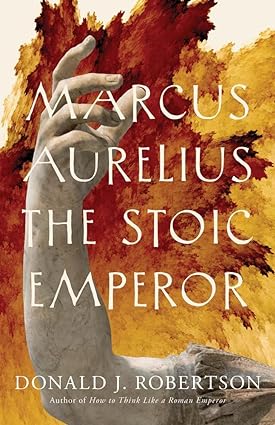Excerpt from Chapter 7 of Marcus Aurelius: The Stoic Emperor by Donald J. Robertson
Once his formal studies in philosophy were under way, Marcus Aurelius began hearing more about a great Stoic philosopher who had recently died at Nicopolis in Greece toward the end of Hadrian’s rule. Banished by the emperor Domitian during a political purge four decades earlier, this former slave attracted many students, although he never committed anything to writing. In the years following his demise, his profound wisdom and uniquely powerful voice seemed to have been lost forever.
If the sage of Nicopolis had lived a little longer, Antoninus might have brought him back to Rome along with his fellow Stoic Apollonius. Marcus could, alternatively, have made the pilgrimage east, to sit at the master’s feet in Greece. Epictetus, though a near contemporary of Marcus, would later be ranked by him as one of the greatest philosophers in history, alongside Socrates and Chrysippus, the finest scholar of early Stoicism. This demonstrates the exceptionally high regard in which Marcus held Epictetus. (It is as striking as comparing a modern-day playwright to Shakespeare.) The young Caesar felt himself to have narrowly missed out on the opportunity to meet the most revered philosopher of his age.
Junius Rusticus would surely have quoted Epictetus to Marcus, which doubtless infuriated him, as Rusticus’s remarks were often intended to challenge Marcus’s conceit. Rusticus would proclaim, in his typically outspoken way, that it was nothing but foolish vanity for his student to wear his imperial purple robes around the palace. Even the emperor, Antoninus, dressed for the most part like an ordinary senator. We don’t know what their tense exchanges about Marcus’s youthful vanity were like. “But I am Caesar!” we might imagine him snapping. “On the contrary,” Rusticus may have replied, smiling, “you are a weak little soul, carrying around a corpse, who believes himself to be Caesar.” If these are the sort of teachings Rusticus derived from Epictetus, it is easy to see why a Roman noble of Marcus’s status would have found them so challenging. Nevertheless, they remained close. Rusticus provoked Marcus’s temper, but he also showed him how to restore friendship after a quarrel.
During Hadrian’s early stays in Greece, perhaps when he served as archon of Athens, around 112, he attended Epictetus’s lectures. Hadrian reputedly became friends—hard though this is to imagine—with Epictetus, and at some point also met one of his most devoted students, a Greek writer named Arrian, to whom we owe our knowledge of Epictetus’s thought. After he was acclaimed emperor, Hadrian promoted Arrian, making him suffect consul in 130. (Two ordinary consuls, consules ordinarii, were elected each January and normally served for one year, but if one resigned or passed away the senator who filled his role for the remainder of his term assumed the slightly less prestigious title suffect consul.) Eventually Arrian was appointed prefect of Cappadocia, one of the most senior posts in the Roman military. The first we hear of Marcus’s philosophy teacher Junius Rusticus is his appointment as suffect consul under Hadrian soon after this, in 133.
The missing link between Epictetus and Marcus Aurelius comes from a remarkable statement about Arrian and Rusticus made by a fourth-century Roman orator called Themistius, who vividly describes how military service brought these two famous Stoics together.
[The emperors Hadrian, Antoninus, and Marcus Aurelius] pulled Arrian and Rusticus away from their books, refusing to let them be mere pen-and-ink philosophers. They did not let them write about courage and stay at home, or compose legal treatises while avoiding the public domain that is law’s concern, or decide what form of government is best while abstaining from any participation in government. The emperors to whom I am now alluding consequently escorted these men to the general’s tent as well as to the speaker’s platform. In their role as Roman generals, these men passed through the Caspian Gates, drove the Alani out of Armenia, and established boundaries for the Iberians and the Albani. In other words, Rusticus served alongside Arrian, in 135, during Rome’s war against the Alani, an aggressive tribe of Sarmatian nomads. The Alani had crossed the Caucasus mountain range to attack the Roman client state of Armenia via neighboring Caucasian Iberia (Eastern Georgia) and Caucasian Albania (Azerbaijan).
Arrian was in command of the three Cappadocian legions, whereas Rusticus, being a younger man of consular rank, presumably served under him as a legionary legate. We can only imagine the conversations these two famous Stoics must have had during their military service together. It may even have been Arrian who first introduced Rusticus to Stoic philosophy by handing him a copy of his private notes on Epictetus’s lectures.
Marcus Aurelius would later express gratitude for the fact that Rusticus gave him a copy of certain notes (hypomnemata), from his private collection, containing the teachings of Epictetus. This was quite possibly one of the most significant events in Marcus’s life, at least in relation to his love of philosophy. As he elsewhere quotes repeatedly from the Discourses transcribed by Arrian we can assume that this was the book Rusticus gave him. There were originally eight volumes of the Discourses, though only four survive today. As well as quoting from the four extant books, Marcus also seems to attribute otherwise unknown sayings and passages to Epictetus. This suggests that he read the four missing volumes of Epictetus’s Discourses. Yet for a time, perhaps until they reached Marcus and his court, almost no one knew such writings existed. Indeed, when Arrian later published the Discourses, he added a preface stressing that they were originally intended to be circulated privately among his closest friends. “I do not know how they fell into the hands of the public,” he says, “without either my consent or my knowledge.”
Marcus particularly admired Rusticus for his frank and unpretentious manner, typical of a Stoic and quite a contrast with the Sophists. Marcus refers in particular to a letter of unknown date addressed to Lucilla, his mother, which exemplified the sort of straight talking of which we know she approved. Rusticus sent it from the coastal town of Sinuessa, which lies on the Appian Way, the road connecting Rome with the Adriatic port of Brundisium (modern-day Brindisi). He was perhaps writing to Lucilla on his return from the East, shortly after Arrian’s victory in the war against the Alani. It was customary for educated Romans to send letters ahead announcing their arrival, and notifying the recipient of their desire to meet in person. Marcus would have been turning fifteen, and already had a passion for philosophy. The simple frankness of this letter must have impressed Lucilla as a relief from the verbal chicanery of the Sophists. Maybe for this reason, fresh from the war, and his conversations with Arrian, Rusticus was appointed by Lucilla to serve as her son’s private tutor in Stoicism.
Donald Robertson is a cognitive-behavioural psychotherapist and author. His is the author of seven books on philosophy and psychotherapy, including Stoicism and the Art of Happiness, How to Think Like a Roman Emperor & Marcus Aurelius: The Stoic Emperor. Read more about Donald’s work on his Substack newsletter, Stoicism: Philosophy as a Way of Life.

Discover more from Modern Stoicism
Subscribe to get the latest posts sent to your email.




